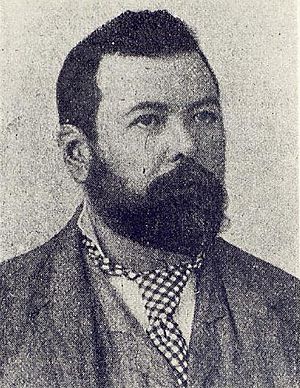Josep Llunas i Pujals facts for kids
Quick facts for kids
Josep Llunas i Pujals
|
|
|---|---|

Josep Llunas i Pujals c. 1900
|
|
| Born | 30 January 1852 |
| Died | 23 May 1905 (aged 53) |
| Nationality | Catalan |
| Citizenship | |
| Occupation | Typesetter, Journalist |
| Years active | 1870–1905 |
| Organization | FRE-AIT (1870–1881) FRTE (1881–1888) |
| Movement | Anarchism |
Josep Llunas i Pujals (born January 30, 1852, died May 23, 1905) was a writer and thinker from Catalonia, Spain. He believed strongly in freedom and equality for all people.
Josep worked as a typesetter, which means he arranged letters for printing. He also loved music and singing, and even directed plays. He was very important as the secretary of the Catalan Athenaeum of the Working Classes. This was a special place where working people could learn and share ideas. Josep thought that science and knowledge could help create a fair society where everyone was treated equally.
Contents
Josep Llunas's Ideas and Work
Josep Llunas was known for his ideas about how society should be organized. He believed that people should be free to make their own choices. He also thought that everyone should have equal chances in life. He wrote many books and articles about these ideas.
What is a Free-Thinker?
Josep Llunas was a "free-thinker." This means he liked to think for himself. He didn't just follow old traditions or what others told him. He used reason and science to form his own opinions about the world.
His Role in Society
Josep was a key part of the Catalan Athenaeum of the Working Classes. This group was a cultural center for working people. They wanted to learn and grow. Josep helped promote the idea that science could lead to a more equal society. He believed that as people learned more, they would naturally create a fairer world.
Major Writings
Josep Llunas wrote several important works. These books and essays shared his ideas about society and philosophy. Here are some of his well-known writings:
- Estudios filosófico-sociales (1882) – This means "Philosophical-Social Studies."
- La revolució: poema en tres cants (1886) – This was a poem about revolution.
- El Ariete Socialista Internacional (1887) – This title means "The International Socialist Ram."
- Qüestions socials (1891) – This translates to "Social Questions."
- Los partits socialistes espanyols (1892) – This book was about "Spanish Socialist Parties."
- La Ley y la clase obrera (1893) – This means "The Law and the Working Class."
See also
 In Spanish: Josep Llunas i Pujals para niños
In Spanish: Josep Llunas i Pujals para niños
 | Janet Taylor Pickett |
 | Synthia Saint James |
 | Howardena Pindell |
 | Faith Ringgold |

